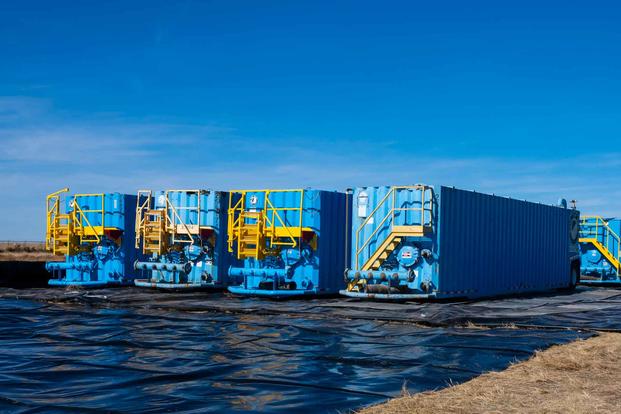
Cannon Air Force Base in New Mexico is investigating the environmental toll after 7,000 gallons of chemically contaminated water spilled on the facility over the summer, according to a public announcement by the base.
The tainted water contained PFAS — per-and polyfluoroalkyl substances commonly known as “forever chemicals” because they do not break down in the environment and build up in the body. The substances are linked to a variety of health conditions and have polluted numerous military facilities and water supplies across the U.S.
The spill happened at the fire training area on base between July 9 and July 15, the base said in a press release Friday, and thousands of gallons of water containing PFAS leaked into a nearby retention pond.
Read Next: US Sailor Is Detained by Venezuela in Latest Case of Service Member Held Overseas
“We understand the concerns of our community, our airmen, and their families,” Col. Robert Johnston, the 27th Special Operations Wing and Cannon Air Force Base commander, said in the news release. “Please know that we are working expeditiously to address the affected area. We are committed to taking all necessary steps to ensure such incidents do not happen again in the future.”
PFAS, which have been used by the Air Force and other service branches in firefighting foam, have potential adverse health effects, according to the Centers for Disease Control and Prevention, including kidney and testicular cancer, increased cholesterol levels, and changes in liver enzymes.
Over the past decade, there has been more public outcry about PFAS and related chemicals leaching into water systems in communities near military installations.
Since 2015, the Air Force has found that 191 of 204 of the service’s installations and sites had released PFAS into the environment, the Air Force Installation and Mission Support Center said in a press release this summer.
The contaminated water involved with the July spill had been removed from emergency vehicles as part of the Department of the Air Force’s “effort to eliminate legacy PFAS-containing aqueous film forming foam (AFFF) from its inventory,” Cannon Air Force Base said in a news release.
Wells that provide drinking water for the base are located upstream “and are not affected by the release,” it said. Additionally, base officials do not believe off-base wells will be affected.
The water was deposited in a lined retention pond, and base leaders were not notified of the release of the PFAS water until early August. The liquid was recovered, and the sediment was removed and relocated to containers. The base said it was waiting for notification of where it can be properly disposed of.
The retention pond’s liner was inspected by a contractor on Aug. 23, and it was revealed that there were tears in various spots. The Air Force notified the New Mexico Environment Department the day after the tears were discovered.
Cannon is sampling the area to weigh the environmental effect. Johnston, the base commander, also ordered all waste chemicals to be relocated to a central location at the installation until they can properly be disposed of.
“Johnston has ordered a comprehensive investigation into the cause of the improper deposit,” the base said in the news release. “Additionally, he has appointed a task force to examine and review all current environmental compliance training, policy and procedural guidance to ensure strict adherence to applicable requirements moving forward.”
The Department of the Air Force is expected to provide a public update on its efforts and investigation into the PFAS leak on Nov. 12.
The New Mexico Environment Department has announced, as part of an ongoing project, it is offering free PFAS blood tests between Sept. 12 and Sept. 18 to residents who have lived or worked in the area immediately around the base, according to the agency’s website.
The news of the PFAS spill at Cannon comes as the Environmental Protection Agency has cracked down on the chemicals and has set new standards, to which the Air Force will adhere, Military.com previously reported.
But it has also sought to dodge some instances in which local communities and the EPA are asking the service to be held accountable for environmental contamination.
Military.com reported last month that Air Force lawyers had pushed back against an emergency order to clean up contaminated drinking water in Arizona by citing a recent Supreme Court ruling that restricts regulatory agencies.
Related: Air Force Bucks EPA Order to Clean Up ‘Forever Chemicals’ in Arizona, Citing Supreme Court Ruling






